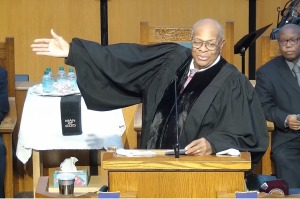Four Steps to Building a Bridge between Then and Now
The best metaphor for preaching is bridge-building. Your job as a preacher is to build a bridge between the ancient text and the contemporary audience. On one side of the bridge is then. On the other side is now.
We all naturally drift to one of those sides. Some of you know Jerusalem better than your own city. You'd spend six days a week locked up in your study researching verb tenses and historical background.
Others of you drift to the now side more naturally. You don't care about the biblical world as much. You want to know what's going on in the lives of the people to whom you preach. You're thinking of the woman in the pew whose husband has just left her. You're thinking about the man who has an addiction to pain medicine.
On one side you have someone who goes on and on about every detail of the text. On the other side you have a self-help preacher who is more interested in passing fads than the eternal Word of God. They're both wrong. We've been called to connect God's Word with the world today. You can't fall off on either extreme.
It's easy to be biblical if you don't care about being relevant. It's easy to be relevant if you don't care about being biblical. But as pastors, we're called to be both. The challenge of preaching is to declare eternal truth (what doesn't change) in a culture that's always changing. The message never changes. It's the "faith that was once for all entrusted to the saints" as Jude (v.3 NIV) calls it. But the methods have to change with every generation. Otherwise you're not being faithful to the intent of the Bible.
Martin Luther said this: "If you preach the gospel in all aspects with the exception of the issues which deal specifically with your time, you are not preaching the gospel at all."
How do you build a bridge between God's Word and our current situation? Let me give you four steps.
Observation: You start by studying the Bible. If you've never taken a class on that, let me recommend a book to you: Bible Study Methods. I wrote it when I was in college. I had a real hunger to study the Bible, but there were no books that showed me how. Most books on Bible study just focused on why I needed to study the Bible, not how. So I wrote my own.
You may start by studying a particular passage (as you would with a verse-by-verse study). Or you may look at all of Scripture on a particular topic. Regardless, you start by studying the Scripture.
Implication: You find the timeless truth from the Scripture you've studied. What does the Word say that spans across time? Everything else builds on what that truth is.
Contextualization: Think about your audience. Think about what their needs might be. What are their hurts? What are their fears? What are their sins? After I exegete the biblical text, I need to exegete my audience.
Every time I preach I know six realities about my audience. You can start with these six understandings.
Every person wants to be loved.
Everybody wants their life to count.
Life is empty without Christ.
Many people carry a load of guilt.
Many are consumed with bitterness from a past hurt.
There's a universal fear of death.
Then you take it further by getting specific about the needs of your particular audience.
Personalization: Once you've studied God's Word, discovered the eternal truth, and thought about your audience, you've got to apply the eternal truth to the particular needs of your audience. Consider their age, culture, spiritual maturity, and other traits. Then ask yourself a few questions. What would it look like in their lives if they took that eternal truth seriously? What would they need to do to act on that truth? When you discover that, you've discovered the application.
Unless you take your audience from observation to personalization, you're not building a bridge and you're not doing justice to God's Word. Like I mentioned earlier, we often focus on only one side of the bridge. We'll often do observation and implication well but ignore the other two. Or we'll do contextualization and personalization and ignore the first parts of the equation.
Life change happens when we do our part by preaching across the whole bridge. I love to see God change lives. Since you're in ministry, I imagine you're the same way.
I know it's not easy to be a bridge builder. We need the help of other pastors. That's why we've completely redone Pastors.com in a way that'll help you engage with a community of other pastors. On the site you'll be able to get in discussion groups with other ministry leaders. You'll find helpful tools (including past archives of the Ministry Toolbox). You'll be able to start your own blog where you can dialogue with others on the site. And you'll be able to get in a weekly video mentoring time with me.





























